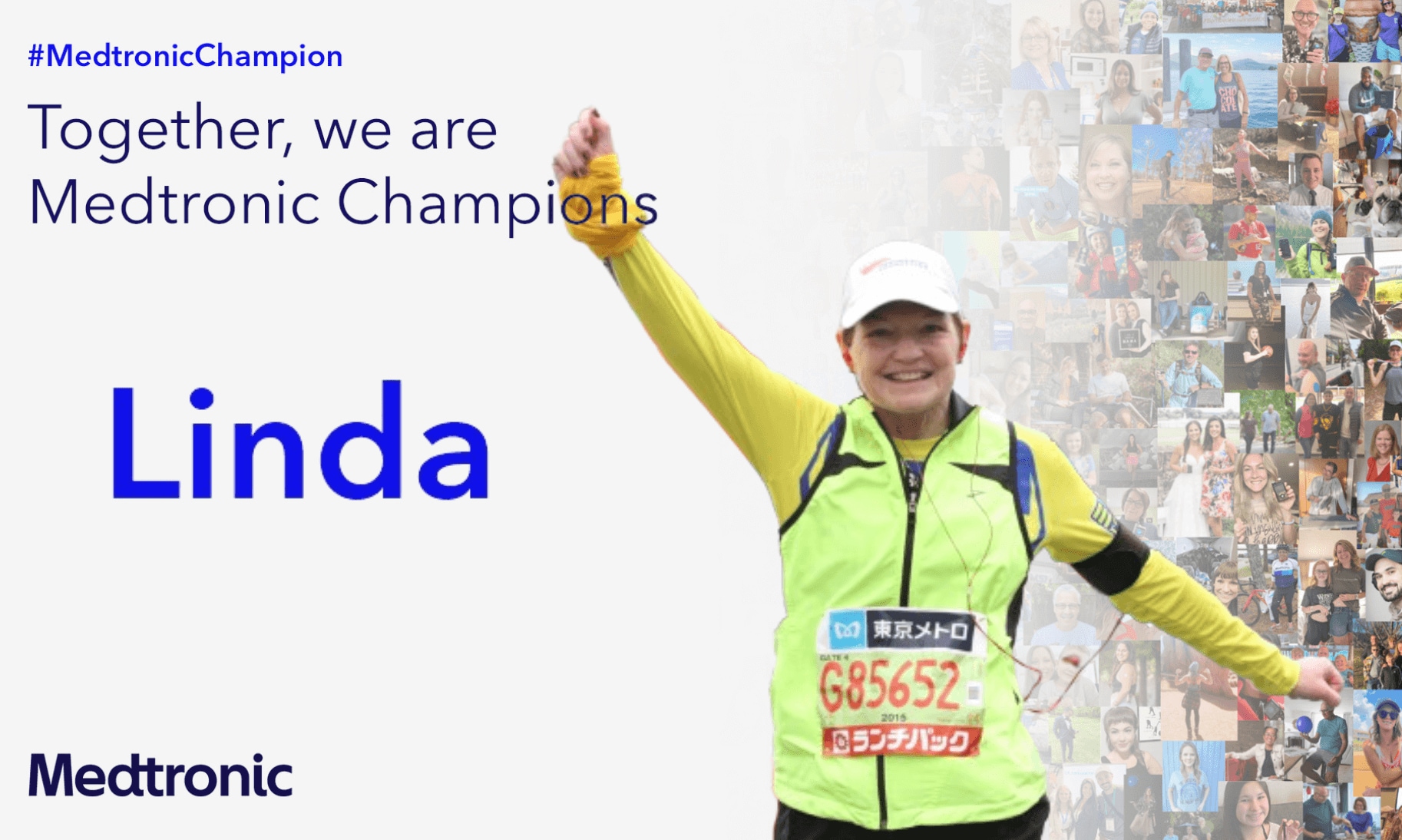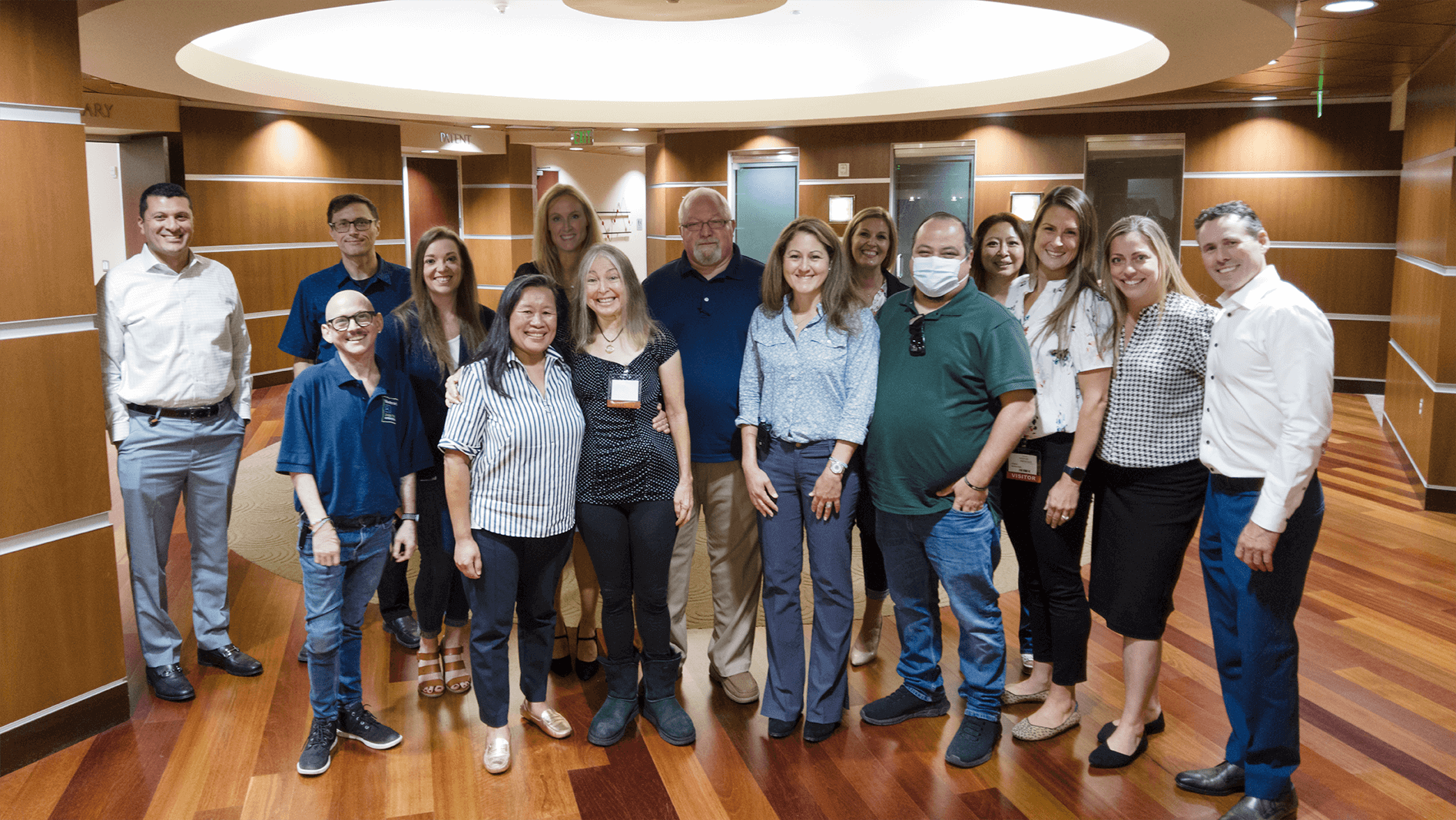Meet #MedtronicChampion Linda

Meet #MiniMedChampion Linda
A recent addition to our #MiniMedChampion community, 61-year-old Linda Carrier is an active runner, golfer, and all-out determinator who doesn’t allow anything to slow her down — including type 1 diabetes.
Having been diagnosed as a teenager, Linda began her therapy with multiple daily injections (MDI) before moving on to an insulin pen. She later made the switch to automated insulin delivery to gain better control of her blood sugars when she began running marathons.
She’s now living with her husband of more than 40 years in the golf mecca of Pinehurst, North Carolina, and enjoying the freedom the MiniMed™ 780G system gives her while she trains for marathons, travels the world rating golf courses, and teaches newly diagnosed T1Ds that life doesn’t have to stop at diagnosis. Here’s her story:
A self diagnosis
I was diagnosed with type 1 diabetes when I was 14, but my sister Kelly was diagnosed when she was eight and I was seven. My parents sent her to a diabetes camp, and since I was the closest to her in age, I went with her and learned all about it alongside her. I would watch her for symptoms and give her injections because she was too afraid to give her own.
I knew the signs to look out for, so I knew when I started showing similar signs: I remember walking through the hallways of my junior high, and I just could not pass a water fountain — I was so, so thirsty. My mom would give us Little Debbie snacks after school, and I remember thinking to myself that day, “This might be your last Little Debbie,” so I made sure to enjoy it before telling my mom, “I think you need to check me for diabetes.”
Determination > diagnosis
To me, being diagnosed with T1D wasn’t such a traumatic thing like it was for my sister since I was already so familiar with it. My parents were more worried because I was very active and energetic as a kid. My sister was a big bookworm and really didn’t have an athletic bone in her body, but I was the first girl on an all-boys baseball team. Growing up, my mom had to constantly tell me to go run around the block to keep me calm! They were fearful of my blood sugars dropping, so they were trying to curb that desire I had to be active. But I wasn’t going to let my diabetes stop me from doing anything I had been doing, or wanted to do.

Running towards my goals
I started running in my 30s. My goal when I first started was that I just wanted to see if I could do it. After my first marathon, I thought, “That was pretty easy! Let’s see if that was a fluke.” So, I ran my second one a year later. Through the years, it’s just been a matter of figuring out what works for me on the different pumps, like whether I can eat before or not, or if I should have insulin on board or not. I actually got on pump therapy when I first started running more because I was struggling a bit with my blood sugars. My new doctor showed me the Paradigm™ pump, and I’ve been on Medtronic pump therapy ever since!
Each time, it just gets better — now, with the MiniMed™ 780G system, my blood sugars don’t typically drop even on longer runs. Before, they’d go up a little or drop a little, but the MiniMed™ 780G system helps keeps me in range. It’s made my life feel closer to that of a non-diabetic’s; it’s been life-changing.
Best piece of advice for others
Besides getting yourself a very good endocrinologist, don’t freak out about your targets. I see this a lot in type 1s: “I want to be 100 percent in range 100 percent of the time.” If that’s what you want, your entire life is going to be consumed with that.
Back in the day, we didn’t have continuous glucose monitors; we only checked our levels so many times a day. Now, with CGM, we know so much more, which is great! But newer-diagnosed diabetics tend to check constantly, and freak out every time their blood sugars go a little high, a little low. Remember: it’s a range. What you don’t want is a big spike or drop. I always say to think of it like a wave of water — it’s going to ebb and flow, and that’s okay as long as it’s not a tsunami! Keep in mind the overall goal, but don’t make yourself crazy obsessing over your numbers.
“I am a #MiniMedChampion because I don’t believe in recreating the wheel. I love talking to newly diagnosed families about their fears, what to expect, how to live a full life with this disease, and sharing my experiences. Being a MiniMed Champion also allows me to work with other Champions and learn about what works and doesn’t work for them. This body of knowledge is powerful and should be shared!”
The testimonial above relates an account of an individual’s experience using a Medtronic device. The account is genuine, typical, and documented. However, this individual’s experience does not provide any indication, guide, warranty, or guarantee as to the response or experience other people may have using the device. The experience other individuals have with the device could be different. Experiences can and do vary. Please talk to your doctor about your condition and the risks and benefits of Medtronic devices.
How to set your email preferences
Important safety information: MiniMed™ 780G system with SmartGuard™ technology with Guardian™ 4 sensor
The MiniMed™ 780G system is intended for continuous delivery of basal insulin at selectable rates, and the administration of insulin boluses at selectable amounts for the management of type 1 diabetes mellitus in persons seven years of age and older requiring insulin as well as for the continuous monitoring and trending of glucose levels in the fluid under the skin. The MiniMed™ 780G system includes SmartGuard™ technology, which can be programmed to automatically adjust insulin delivery based on the continuous glucose monitoring (CGM) sensor glucose values and can suspend delivery of insulin when the sensor glucose (SG) value falls below or is predicted to fall below predefined threshold values.
The Medtronic MiniMed™ 780G system consists of the following devices: MiniMed™ 780G insulin pump, the Guardian™ 4 transmitter, the Guardian™ 4 sensor, One-press serter, the Accu-Chek™ Guide Link blood glucose meter, and the Accu-Chek™ Guide test strips. The system requires a prescription from a healthcare professional.
The Guardian™ 4 sensor is intended for use with the MiniMed™ 780G system and the Guardian 4 transmitter to monitor glucose levels for the management of diabetes. The sensor is intended for single use and requires a prescription. The Guardian™ 4 sensor is indicated for up to seven days of continuous use.
The Guardian™ 4 sensor is not intended to be used directly to make therapy adjustments while the MiniMed™ 780G is operating in manual mode. All therapy adjustments in manual mode should be based on measurements obtained using a blood glucose meter and not on values provided by the Guardian™ 4 sensor. The Guardian™ 4 sensor has been studied and is approved for use in patients ages 7 years and older and in the arm insertion site only. Do not use the Guardian™ 4 sensor in the abdomen or other body sites including the buttocks, due to unknown or different performance that could result in hypoglycemia or hyperglycemia.
WARNING: Do not use the SmartGuard™ feature for people who require less than 8 units or more than 250 units of total daily insulin per day. A total daily dose of at least 8 units, but no more than 250 units, is required to operate in the SmartGuard™ feature. |
WARNING: Do not use the MiniMed™ 780G system until appropriate training has been received from a healthcare professional. Training is essential to ensure the safe use of the MiniMed™ 780G system.
WARNING: Do not use SG values to make treatment decisions, including delivering a bolus, while the pump is in Manual Mode. When the SmartGuard™ feature is active and you are no longer in Manual Mode, the pump uses an SG value, when available, to calculate a bolus amount. However, if your symptoms do not match the SG value, use a BG meter to confirm the SG value. Failure to confirm glucose levels when your symptoms do not match the SG value can result in the infusion of too much or too little insulin, which may cause hypoglycemia or hyperglycemia.
Pump therapy is not recommended for people whose vision or hearing does not allow for the recognition of pump signals, alerts, or alarms. The safety of the MiniMed™ 780G system has not been studied in pregnant women, persons with type 2 diabetes, or in persons using other anti-hyperglycemic therapies that do not include insulin. For complete details of the system, including product and important safety information such as indications, contraindications, warnings and precautions associated with system and its components, please consult https://www.medtronicdiabetes.com/important-safety-information#minimed-780g and the appropriate user guide at https://www.medtronicdiabetes.com/download-library



